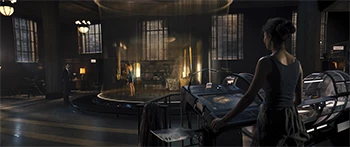Lisa Joy’s feature debut Reminiscence is equal parts neo‑noir mystery and classic sci‑fi. Had either part dominated, the result would have been far less attractive, but the balanced combination makes for an intriguing – maybe somewhat drawn‑out – story with something to say about the way we treat memories. An abundance of arresting images accompanied by an ever so engaging score by Ramin Djawadi forms a coherent vision not unfamiliar to followers of Joy’s previous work as a writer and producer.
As the co‑creator of Westworld, Joy established herself as a purveyor of intellectual science fiction. Some found the show about the android hosts of a Western theme park gaining sentience overly cryptic, even pseudo‑philosophical. But looking at the past couple of decades of sci‑fi films and television, it should be reasonably evident that Westworld more than many has offered meaningful ideas within some of the core thought‑traditions in the genre, such as the nature of consciousness and the role of deterministic thought.
Joy leaves artificial intelligence behind in Reminiscence to take on another prototypal topic – memory recording. Films such as Strange Days and Extracted have explored it before, as has episodes of Black Mirror. All these depictions have in common that the context they present is a rather sinister one. That familiar theme of recorded memories and their application in law enforcement, with the obvious privacy implications, does have a place in Reminiscence. But at the same time, the very nature of memories, what makes us want to revisit them and how they build identity, sits firmly at the centre of the narrative.
At the surface, Reminiscence is about the veteran Nick Bannister (Hugh Jackman), who somewhat reluctantly has found a new line of work as a memory technician and investigator. Many of his customers just want to relive happy moments of their life and can do so immersively with Bannister’s tech setup, operated jointly with his only employee, the electronics wizard Watts (Thandiwe Newton). However, the other side of the business is helping police and district attorneys solve crimes by delving into the memories of suspects and other elements that might hold some version of the true past in their heads.
The war both Nick and Watts once fought in is related to an ongoing climate crisis, which sets much of the tone in Reminiscence. The future Miami where the duo works have long since been submerged beneath a rising ocean, as have all other coastal cities. Only the topmost parts of the Floridian high‑rises peek above the surface, and society has rearranged its urban planning accordingly. It’s not the most common version of dystopia seen on film, where pollution, desert creep, or similarly dry threats have transformed earth. Reminiscence looks like if Blade Runner was set in Venice, wetness engulfing far more than the occasional cyberpunk hard rain can aspire to. Only the so‑called barons are dry. These corrupt and subsequently rich gangster actors have carved out little oases of livable space; water pumped away using elaborate engineering, further flooding the poor surroundings.
Like you would expect, all these elements converge into what becomes an archetypal film noir essentially. The mysterious Mae (Rebecca Ferguson) pays a visit, supposedly looking for a misplaced set of keys that the machinery can help her uncover. But, as we all know by now, the femme fatale in the red dress means trouble, and trouble is what Nick finds. You’ll have your crooked cop, your psychotic drug kingpin, your bought politicians, your troubled pasts.
What elevates Reminiscence above what could be parsed as an almost too on‑the‑nose noir is how it uses its specific futurisms to play with that expectation. The same climate crisis has made the daytime too hot even to be bearable, so society as a whole has flipped the hours and gone entirely nocturnal, playfully messing with the typical noir’s relation to night and day. Cars – except skyscrapers, maybe the most apparent markers of the menacing city seen in the noirs – have been replaced with boats and other floating vessels. Urban unrest, sometimes likened with a dam about to break, for once takes that exact concrete form as citizens riot against their leveed masters.
These are just some of the ways that Reminiscence nicely blends elements of two genres not absentmindedly for effect but with intention. Going back to the philosophical underpinning of the film, the meaning of memories, this is where Joy excels at this genre subversion. When Nick’s memories of the magnetic Mae – that he spends most of the movie looking for – become almost absurdly male‑fantasy‑like, it’s because they are. He makes them that way. We constantly reshape our memories, amplifying the parts we like, letting unwanted elements quietly disappear. Nick keeps romanticising his encounters with Mae, trying to keep new truths at bay, maybe subconsciously. But one abrupt awakening after another, he must come to terms that the Mae of his mind’s eye is a construct.
Reminiscence is slightly unevenly paced and sometimes moves dangerously close to cliche territory in its neo‑noir ambitions. But Lisa Joy has paired that framework with a futuristic setting that adds substantial dimension and a technological vision that’s far more than a gimmick. Other works of science fiction go deeper into the nature of memories, and there is undoubtedly more iconic hard‑boiled noir out there. But at the intersection of the two, Reminiscence is an excellent addition.
Reminiscence premieres in US cinemas on August 20, 2021, and in most other territories in late August.

